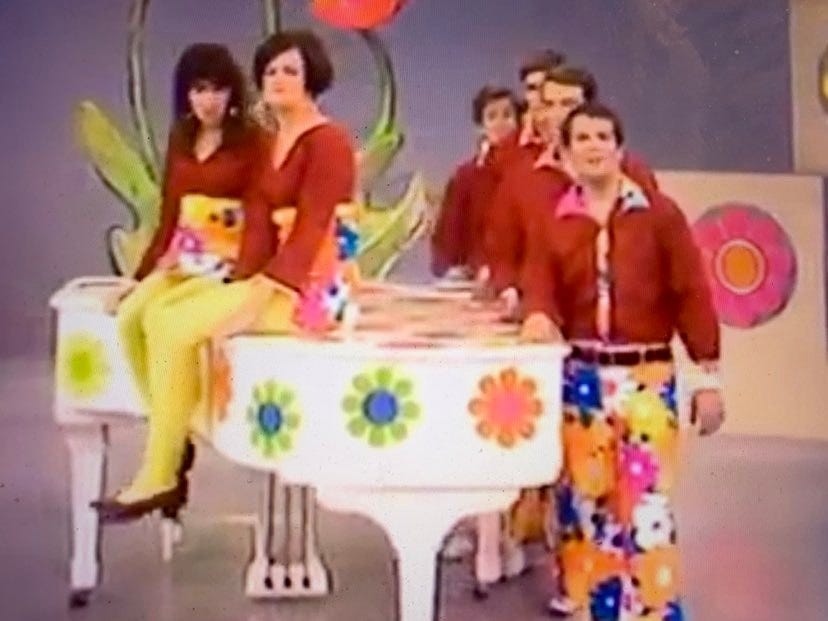On entering adolescence during the tectonic shift
To say 1968 was a pivotal year is a colossal understatement
The Young Folk performing "Feelin' Groovy" on the Red Skelton Hour, 1968
The photo accompanying this piece is a still capture from a video I saw on Facebook recently. Liberace and a vocal group I'd never heard of before called the Young Folk are performing "The 59th Street Bridge Song," better known as "Feelin' Groovy," a Paul Simon composition about taking one's time to be in the moment on a carefree morning. The television program is The Red Skelton Hour. Skelton was one of the last of the old-school comedians. He could be hilariously goofy, but he was never edgy, and he often took time on his show to offer his sincere thoughts about things like America's greatness.
The Young Folk's pants are something else, aren't they? It's clear that the squares were getting in on the last burst of flower power from the previous year's Summer of Love.
And consider the writer of the song. Simon had started out haunting the cubicles of the Brill Building, billing himself as Jerry Landis and fronting a neo-doo-wop group called Tico and the Triumphs. In 1964, he and boyhood chum Art Garfunkel got in on the folk boom, and much of his output took a topical and reflective turn.
The confluence of all these factors prompted me to share the video on my own page, with the caption, "A snapshot from the moment when our culture was on the cusp of the big changeover."
1968. The sunny vibes of the above-mentioned Summer of Love were giving way to New Left radicalism, manifested in such occurrences as the shutdown of classes and administrative-offices takeover at Columbia University the week before finals, and the riots outside the Democratic National Convention in Chicago in August. With Martin Luther King's assassination, the integrationist chapter of the civil rights movement came to a close and the rise of the Black Panthers filled the vacuum. CBS Evening News anchor Walter Cronkite took the occasion of the Tet Offensive to opine to the public that America was bogged down in a quagmire in Vietnam.
Currents afoot would have effects that last to this day. The National Organization for Women was founded two years earlier. The Stonewall Inn riot would occur the following year. The Roe v Wade Supreme Court decision would be handed down five years later.
Pop-psychology movements such as Transactional Analysis, Primal Scream therapy and est appeared with the onset of the 1970s.
The above-discussed video takes on a certain poignancy when one considers the popular-culture changes wrought by 1968.
The Beatles' manager, Brian Epstein, had died the previous year, and the group went from being a show-business act to being the agent by which all popular music took its cue from the rock ethos.
Expletives began appearing in movies. Steve McQueen uttered the term 'bullshit" in 1968's Bullitt and in 1969 the Sundance Kid, portrayed by Robert Redford yelled "Shit!" as he and Butch Cassidy, played by Paul Newman, jumped off cliff into a stream to escape an approaching posse.
In January 1969, Philip Roth's Portnoy's Complaint, a novel about a young man confessing, in lurid detail, his wanking obsession to his therapist, was published.
For the record, I turned 13 in 1968.
Some very basic aspects of American life that were taken as givens in my childhood have undergone profound changes in ensuing decades. The marriage rate, in steady decline for years, fell to an all-time low in 2018. As of 2019, the US had the highest number of children living in a single-parent household in the world.
Three in ten Americans are now religiously unaffiliated.
Drug-overdose deaths in the US reached another record high this year.
As we all know, the spree-killing trend, which got underway in 1966, when Charles Whitman ascended the University of Texas campus tower in Austin and shot 16 people, has made our present year a grim succession of carnage scenes of near-daily occurrence.
I'm prepared for the possible response to this essay along the lines of "Haven't you Boomers shared just about enough of your reflections with subsequent generations?"
Look at it this way. The day is coming when you won't have first-hand accounts of a time before family friendly drag shows and Pride Whoppers.
You'll get all your accounts of people embracing such quaint notions as a transcendent order and a biologically verifiable sexual dichotomy from history books. Do you think you'll get an objective depiction of what life was like before the great tectonic shift?
Life used to be very different, and lots of people still maneuvering through society can explain how in vivid detail. We're the last Americans to have had our formative years in that utterly foreign time.
Pull up a chair and hear all about it.


